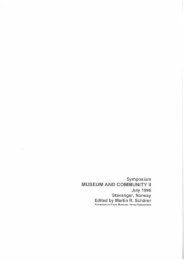Key Concepts of Museology - ICOM
Key Concepts of Museology - ICOM
Key Concepts of Museology - ICOM
Create successful ePaper yourself
Turn your PDF publications into a flip-book with our unique Google optimized e-Paper software.
sations. The pr<strong>of</strong>essional defi nition<br />
<strong>of</strong> museum most widely recognized<br />
today is still that given in 2007 in the<br />
Statutes <strong>of</strong> the International Council<br />
<strong>of</strong> Museums (<strong>ICOM</strong>): “A museum<br />
is a non-pr<strong>of</strong>i t, permanent institution<br />
in the service <strong>of</strong> society and its<br />
development, open to the public,<br />
which acquires, conserves, researches,<br />
communicates and exhibits<br />
the tangible and intangible heritage<br />
<strong>of</strong> humanity and its environment for<br />
the purposes <strong>of</strong> education, study and<br />
enjoyment.” This defi nition replaces<br />
that used as the term <strong>of</strong> reference<br />
for over 30 years: “A museum is a<br />
non-pr<strong>of</strong>i t making, permanent institution<br />
in the service <strong>of</strong> the society<br />
and its development, and open to the<br />
public, which acquires, conserves,<br />
researches, communicates, and exhibits,<br />
for purposes <strong>of</strong> study, education<br />
and enjoyment, material evidence <strong>of</strong><br />
man and his environment” (<strong>ICOM</strong><br />
Statutes, 1974).<br />
The difference between these two<br />
defi nitions, which is at fi rst sight<br />
barely signifi cant – a reference to<br />
the intangible heritage added and<br />
a few changes in structure – nevertheless<br />
attests on the one hand to the<br />
preponderance <strong>of</strong> Anglo-American<br />
logic within <strong>ICOM</strong>, and on the other<br />
to a diminution <strong>of</strong> the role given to<br />
research within the institution. Initially<br />
the 1974 defi nition, written in<br />
French as the lead language, was a<br />
fairly free translation into English to<br />
better refl ect the Anglo-American<br />
logic about museum functions – one<br />
<strong>of</strong> which is the transmission <strong>of</strong> heri-<br />
tage. English has become the working<br />
language most widely used in<br />
council meetings, and <strong>ICOM</strong>, like<br />
most international organisations,<br />
now operates in English too; it seems<br />
that the work to draft a new defi nition<br />
was based on this English translation.<br />
The structure <strong>of</strong> the French<br />
defi nition <strong>of</strong> 1974 emphasised<br />
research, introduced as the driving<br />
force <strong>of</strong> the institution: “Le musée est<br />
une institution permanente, sans but<br />
lucratif, au service de la société et de<br />
son développement, ouverte au public<br />
et qui fait des recherches concernant<br />
les témoins matériels de l’homme<br />
et de son environnement, acquiert<br />
ceux-là, les conserve, les communique<br />
et notamment les expose à des fi ns<br />
d’études, d’éducation et de délectation.”<br />
(<strong>ICOM</strong> Statutes, 1974). The<br />
literal translation, but not the <strong>of</strong>fi cial<br />
one, reads: “A museum is a permanent,<br />
non-pr<strong>of</strong>i t institution, in the<br />
service <strong>of</strong> the society and its development,<br />
open to the public, which<br />
does research regarding the material<br />
evidence <strong>of</strong> man and his environment…”,<br />
In 2007 the principle <strong>of</strong><br />
research (modifi ed in French by the<br />
word étudier - to study) was relegated<br />
to a list <strong>of</strong> the general functions<br />
<strong>of</strong> museums, as in the 1974 English<br />
version.<br />
2. For many museologists, and in<br />
particular those who claim to adhere<br />
to the concept <strong>of</strong> museology taught<br />
in the years 1960-1990 by the Czech<br />
school (Brno and the International<br />
Summer School <strong>of</strong> <strong>Museology</strong>), the<br />
museum is only one means among<br />
57
















